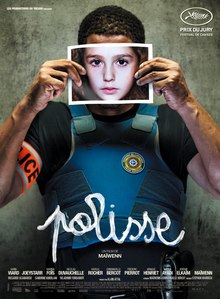Poliss
| Polisse | |
|---|---|

Theatrical release poster
|
|
| Directed by | Maïwenn |
| Produced by | Alain Attal |
| Written by | Maïwenn Emmanuelle Bercot |
| Starring |
Karin Viard Marina Foïs Joeystarr |
| Music by | Stephen Warbeck |
| Cinematography | Pierre Aïm |
| Edited by | Laure Gardette |
|
Production
company |
Les Films du Trésor
|
| Distributed by | Mars Distribution |
|
Release date
|
|
|
Running time
|
127 minutes |
| Country | France |
| Language | French |
| Budget | €6.1 million |
| Box office | $20.3 million |
Polisse (released at some film festivals as Poliss, French pronunciation: [pɔˈlis]) is a 2011 French drama film written, directed by and starring Maïwenn. It also stars Joeystarr, Karin Viard, Marina Foïs, Nicolas Duvauchelle, Emmanuelle Bercot and Riccardo Scamarcio. The film centres on the Child Protection Unit (Brigade de Protection des Mineurs) of the Paris Police, and a photographer who is assigned to cover the unit. The title is derived from Maïwenn's son's misspelling of the word "police".
The film won the Jury Prize at the 2011 Cannes Film Festival and in 2012, was nominated for thirteen César Awards.
The police of a Child Protection Unit squad try to maintain their sanity and their home lives without being destroyed by their work, tracking paedophiles, arresting parents suspected of mistreating their children, following teenage pickpockets, runaways or those sexually exploited, helping in the protection of homeless children and the victims of rape. In moments of relaxation the squad gossip, quarrel, drink, dance; relationships tremble, break and are remade or newly made. Their boss is a political policeman, not wholly sympathetic to the demands of their consciences, and ready to tighten the leash if the man they are questioning has powerful friends. At the centre of the story is a hard-edged, bitter yet tender policeman (Joeystarr) and a photographer (played by director Maïwenn) whose assignment is to follow the squad in their work.
Maïwenn got the idea for the film when she saw a documentary about the Child Protection Unit on television. She was allowed to stay with the officers of the unit to research the subject and get to know what kind of people they were. All the cases in the screenplay were based either on things the director had witnessed during her time with the unit or older cases they told her about. Not letting the viewers know the verdicts of the defendants was a conscious choice, because the police officers seldom get to know it either. Maïwenn wrote a first draft for the screenplay on her own, and was then joined by Emmanuelle Bercot.
...
Wikipedia
